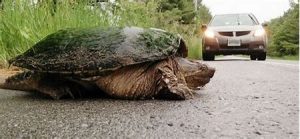My family has owned our cottage for 44 years now and have seen big changes in our lake system. It’s amazing to see how the lake and river have changed over that time.
Some of these changes have been due to the natural aging of the lakes. Lakes can be classified as young (oligotrophic) middle aged (Mesotrophic) and mature (Eutrophic). As lakes go through their natural aging process they become more nutrient rich, shallow and weedy. All lakes age at different rates based on size, shape, depth, shoreline topography, location and current flow. You can easily see this difference as you go from Crotch Lake which is shallow, more stained and weedy, through Horseshoe Lake which starts out weedy and shallow and goes deeper and clearer and then into Bull Lake which is mainly deep with steeper rocky shores.
Every fall when the weeds die and settle to the bottom an ever growing layer of organic material is formed. This is more pronounced in the shallow areas of Crotch and Horseshoe lakes than in the deeper areas. You see this thin layer of muck on your beach every year.
Ten thousand years ago our lakes were probably just bare rock scraped clean by the last glacier. However as life returned slowly the nutrients began to build up to the levels we are currently at. One day, tens of thousands of years from now, our lakes will be a large swamp with a few open spots or maybe scoured clean by the next glacier.
The life cycle of the lake will go on with or without our presence. Plants, fish and microorganisms live grow and die as they have for thousands of years. These water plants and nutrients are important to the lake in the correct balance. The weeds provide oxygen for the fish and homes for the small organisms, minnows and yearling fish to grow giving us the fertile good fishing lakes we have today.
As well the changes in the environment including changes in climate, yearly weather, water temperatures and levels will all have an effect on the quality of the water and what plants and fish thrive in any body of water.
These things we have no control over, however human activity is having an effect on lakes everywhere. Farming is the largest contributor to the unnatural acceleration of aging of a water body. Luckily we have few farms in our area so the main human influence to the lakes are the cottagers.
The most important things that can be done by us as cottagers is to keep excessive nutrients out of the lake. These few easy things everyone can do to keep our lakes clean and from aging excessively fast.
Don’t fertilizer your lawn: Sure we all love nice thick green lawn, however, the same fertilizers that make your grass green run off into the lake and accelerate the weed growth. Accelerated weed and algae grow accelerates the aging of the lake
Don’t dump weeds and leaves in the lake: If you must pull weeds along your shore to create a cleaner swimming area, take those weeds and throw them far from the shore. Weeds thrown in the water will float in mats and probably re-root elsewhere causing thicker weeds and more organic material deposited on the bottom of the lake each fall.
Clean up after your pet.
Ensure your septic system is working well.
As Lake Steward I take monthly water samples and clarity readings from both lakes on behalf of the Ministry of Natural Resources. The readings appear to be good, within ranges of the specific of the ages
of both lakes and similar to other lakes in our area. Checking the records I have found they have been fairly steady since the first samples were done in 2004.
Finally, Prevent other contaminates from entering the lake. Be careful when filling lawn mowers, don’t dump chemicals on the ground or into your septic tank, use water based stains on your decks and keep your keep your boat motor running well.
Our lakes are in great shape and it takes everyone to help keep them that way.

Good information! I would only add that having a good system of lakes is also important from an investment point of view, taking good care of the lakes and wild life it supports is a benefit to everyone.